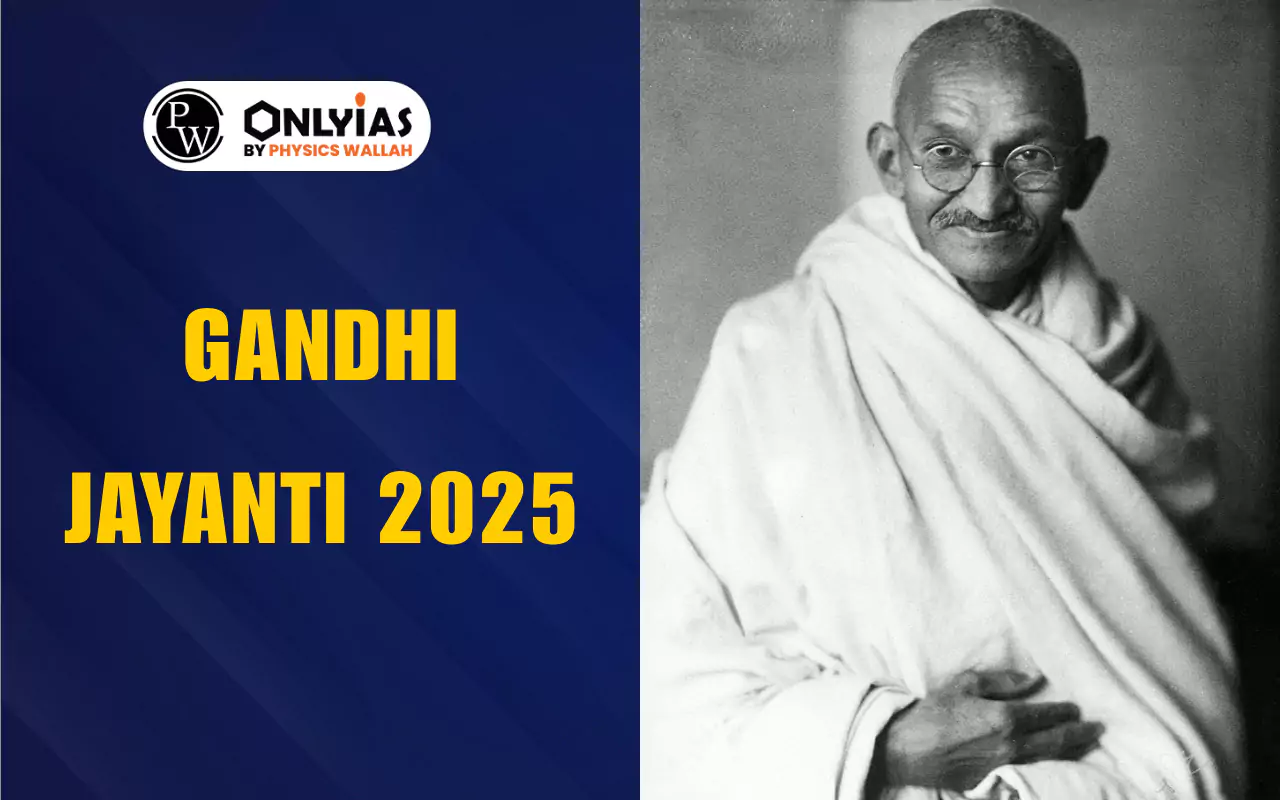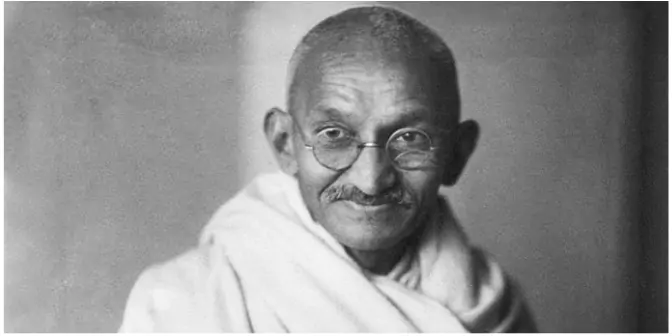Gandhi Jayanti 2025 on 2nd October marks Mahatma Gandhi’s 156th birth anniversary, honoring his life, teachings of non-violence, truth, and service. Celebrations include prayers at Raj Ghat, school events, and global observances on the International Day of Non-Violence, reflecting his lasting influence worldwide.

Gandhi Jayanti 2025 marks a very special day for India and the whole world. It is the day we remember one of the greatest leaders in history: Mahatma Gandhi. His full name was Mohandas Karamchand Gandhi. He is lovingly called the Father of the Nation in India. This day is a national holiday. It is a time for everyone to think about his lessons of truth and nonviolence. This year, Gandhi Jayanti 2025 is extra special. We will be celebrating the 156th birth anniversary of Mahatma Gandhi. This huge event, the birth anniversary of Mahatma Gandhi 2025, shows how important his life and work still are today.
Gandhi Jayanti 2025 will be celebrated on October 2nd. This date is when Mohandas Karamchand Gandhi was born in 1869. He was born in Porbandar, Gujarat, in India. The celebration of Gandhi Jayanti 2025 is a tribute to his memory. He led India’s struggle for independence from British rule. He did this using only peaceful methods. This idea is called Satyagraha, which means holding onto the truth.

The way we observe Gandhi Jayanti 2025 across India is usually very quiet and respectful. Leaders and people often visit the Raj Ghat in New Delhi. This is the memorial where Mahatma Gandhi was cremated. They offer flowers and prayers there. Special prayer meetings and ceremonies are held everywhere. People sing his favorite devotional songs. These songs often speak about peace and unity. The core message of Gandhi Jayanti 2025 is to remember and practice his teachings. These teachings are about simple living, helping the poor, and always choosing peace over conflict. Gandhi Jayanti 2025 is not just a holiday.
List Of International National Days 2025 Month-Wise List
Mahatma Gandhi’s life shows how simple living and high thinking can change the world. His journey from a small town in Gujarat to becoming the “Father of the Nation” inspires everyone. Below, we’ve mentioned a short Mahatma Gandhi biography overview:
| Mahatma Gandhi Biography Overview | |
| Aspect | Details |
| Full Name | Mohandas Karamchand Gandhi |
| Born | 2 October 1869, Porbandar, Gujarat |
| Family Background | Hindu family with strong moral and ethical values |
| Education | Early schooling in Porbandar and Rajkot; studied law in London at University College London and Inner Temple |
| Key Experiences | Faced racial discrimination in South Africa; developed Satyagraha (nonviolent resistance) |
| Major Movements | Champaran Satyagraha, Non-Cooperation Movement, Salt March/Dandi March, Quit India Movement |
| Philosophy | Ahimsa (Nonviolence), Satyagraha (Truth & Moral Courage), Sarvodaya (Welfare for All), Swadeshi (Self-Reliance), Communal Harmony |
| Literary Contributions | “Hind Swaraj”, “The Story of My Experiments with Truth”, edited journals like Young India and Navajivan |
| Global Influence | Inspired leaders like Martin Luther King Jr., Nelson Mandela, Dalai Lama; their methods influenced civil rights movements worldwide |
| Recognition | Nominated five times for the Nobel Peace Prize, “Man of the Year” by Time Magazine (1930), listed among Top 25 Political Icons (2011) |
| Died | 30 January 1948, New Delhi (assassinated) |
lso Read: Mahatma Gandhi Biography
Mahatma Gandhi led many important movements during India’s struggle for freedom. These movements were based on non-violence and involved mass participation. Below, we’ve mentioned Mahatma Gandhi’s major movements:
| Mahatma Gandhi Major Movements | ||
| Movement | Year | Purpose |
| Champaran Satyagraha | 1917 | This was Gandhi’s first Satyagraha in India, it was aimed at securing fair treatment and rights for indigo farmers in Bihar who were being exploited by European planters. |
| Non-Cooperation Movement | 1920-1922 | Gandhi motivated Indians to boycott British goods, schools, courts, and official titles as a way to protest against the British rule and involve the masses in the freedom struggle. |
| Salt March / Dandi March | 1930 | Gandhi led a 240-mile march from Sabarmati Ashram to Dandi to break the salt law imposed by the British, symbolizing mass civil disobedience and peaceful defiance of colonial authority. |
| Quit India Movement | 1942 | During World War II, Gandhi launched this movement demanding the immediate withdrawal of the British from India, inspiring Indians to unite with the slogan “Do or Die.” |
Gandhi’s teachings are simple but powerful. They help people to live with truth, non-violence, and compassion. Below, we’ve mentioned some of Gandhi’s teachings and philosophies:
| Mahatma Gandhi’s Teachings and Philosophy | |
| Principle | Meaning |
| Ahimsa | Gandhi believed that non-violence in thought, word, and action is the most powerful way to fight injustice. |
| Satyagraha | He promoted resistance against oppression through truth and moral courage rather than through violence or hatred. |
| Swadeshi | Gandhi encouraged people to use local goods and promote self-reliance to reduce dependence on foreign products. |
| Sarvodaya | He believed in the welfare of all, especially helping the poor and weaker sections of society. |
| Communal Harmony | Gandhi worked to unite people of all religions and fought against caste-based discrimination to create a peaceful society. |
In India, Gandhi Jayanti 2025 will be celebrated with prayer meetings, speeches, and events at Raj Ghat, where Gandhi was cremated. Schools and colleges organize essay competitions, drawing contests, and debates to teach students about his life. Cleanliness drives in villages and cities will follow Gandhi’s focus on hygiene and self-reliance. On the birth anniversary of Mahatma Gandhi 2025, people will be reminded to live with honesty, simplicity, and service toward the society.
United Nations declared 2 October as the International Day of Non-Violence in 2007 to honor Gandhi’s legacy. In 2025, this day will once again call upon nations to resolve conflicts through peaceful dialogue instead of aggression.
Countries around the world organize seminars, peace marches, and awareness programs inspired by Gandhi’s vision. Leaders often revisit their philosophy to find solutions for modern-day issues like wars, social injustice, and climate challenges.
Mahatma Gandhi’s principles inspired leaders around the world. His way of fighting without violence became an example for civil rights and fairness movements around the world. Below, we’ve mentioned Gandhi’s global influence and legacy:
| Gandhi’s Global Influence and Legacy | ||
| Leader | Country | Influence of Gandhi |
| Martin Luther King Jr. | USA | Gandhi’s ideas inspired King’s fight for civil rights using non-violent protests and civil disobedience. |
| Nelson Mandela | South Africa | Gandhi’s strategies guided Mandela’s campaign against apartheid and promoted justice through peaceful resistance. |
| Dalai Lama | Tibet | Gandhi’s teachings of compassion, non-violence, and harmony influenced the Dalai Lama’s advocacy for peace and human rights. |
Gandhi never received the Nobel Peace Prize, but his contributions were widely acknowledged worldwide. Below, we’ve mentioned Gandhi’s awards and recognitions:
| Mahatma Gandhi’s Awards and Recognition | ||
| Year | Award/Recognition | Details |
| 1930 | Time Magazine “Man of the Year” | Gandhi was recognized for leading the Salt March and his role in India’s civil disobedience movement. |
| 1940s | Nobel Peace Prize Nominations | He was nominated five times for the Nobel Peace Prize but was never awarded. |
| 2011 | Top 25 Political Icons | Gandhi was listed among the Top 25 Political Icons of all time by Time Magazine, highlighting his global influence. |
Gandhi Jayanti 2025 is a day to honor the life of Mahatma Gandhi and his teachings of truth, peace, and non-violence. The 156th birth anniversary of Mahatma Gandhi reminds us that living with honesty, self-reliance, and moral courage can change society. The connection with the International Day of Non-Violence 2025 makes this celebration global. By learning from Mahatma Gandhi biography, his movements, and teachings, people are motivated to resolve conflicts peacefully and spread kindness in their daily lives.
Ready to boost your UPSC 2026 preparation? Join PW’s UPSC online courses today!
Gandhi Jayanti 2025 is a holiday on 2 October to remember Mahatma Gandhi, the Father of the Nation.
We celebrate Gandhi Jayanti to honor Gandhi’s life and his lessons of peace, truth, and helping others.
Mahatma Gandhi was born on 2 October 1869 in Porbandar, Gujarat.
People visit Raj Ghat, offer flowers, hold prayers, and schools organize essays and drawing competitions.
Gandhi taught people about non-violence, truth, and helping everyone, which are still important today.
<div class="new-fform">
</div>